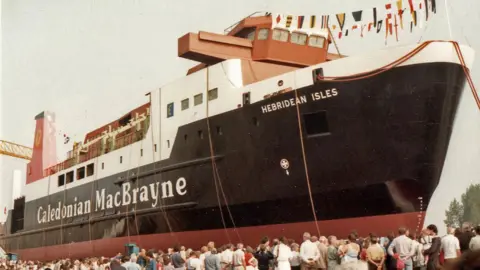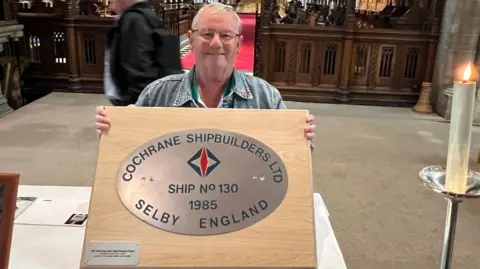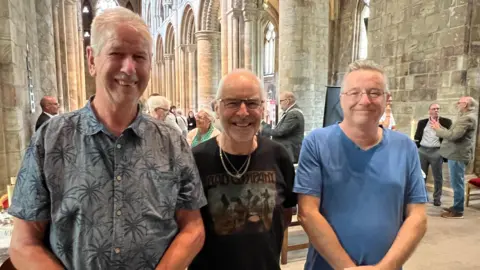Ferry nameplate makes final voyage home
 COCHRANE'S ARCHIVE
COCHRANE'S ARCHIVEThe nameplate of one of Scotland's longest serving ferries has been returned to Selby, where it was built more than 40 years ago.
A special service was held at Selby Abbey to welcome home the small fragment of the former MV Hebridean Isles.
The ceremony was attended by some of those who helped build the vessel as well as workers from Scottish ferry operator Caledonian MacBrayne, who delivered the nameplate.
Among the congregation was Phil Moat, who said: "It's been great to see everyone again - and to see shipbuilding getting some recognition in a beautiful place like this."
Built by Cochrane Shipbuilers, in Selby, at a cost of £5.5m the ship was launched sideways into the River Ouse in 1985.
Over the next four decades the 280ft (85m) ferry made journeys between islands such as Skye, Colonsay and Islay in north-west Scotland, before being withdrawn from service in November.
Also among the crowd at the ceremony was Jim Anderson, who said: "We are ex-shipbuilders. We get the togetherness of a shipyard, and why people are still so proud of a 40-year-old ship. That's why it was important to be here."
 BBC/RICHARD EDWARDS
BBC/RICHARD EDWARDSThe Duchess of Kent was in charge of the formalities at the launch, but it was the technique used to launch the vessel that has stuck long in people's memories.
Workers had to get underneath the hull, hammer away wooden blocks holding the ship in place, then run for cover as it slid towards the river.
David McMillan, known as Mac, said: "The dramatic thing was when you saw people on the opposite bank being hit by the wash from the river.
"The emergency services were shouting 'get back, get back'. People would line up in big crowds - bring all their children - because they'd never seen anything like that."
Paul Welch was one of the workers tasked with hammering away the blocks.
He said: "You've always got one eye on the ship moving. As soon as it moves, you duck and run.
"All launches were special - this was one of many launches the shipyard did over the years.
"Shipbuilding always was important, but today matters because there are so few of us left. We are a dwindling band."
Stephen Mackenzie started at Cochrane's as an apprentice joiner in 1971 - his father and brother worked there as well - and stayed with the firm for 17 years.
He said: "This has been a long time coming. Shipbuilding has been going on here for years and years and we didn't get the recognition. I'm very pleased - shipbuilding is what makes Selby."
 BBC/RICHARD EDWARDS
BBC/RICHARD EDWARDSListen to highlights from North Yorkshire on BBC Sounds, catch up with the latest episode of Look North.
